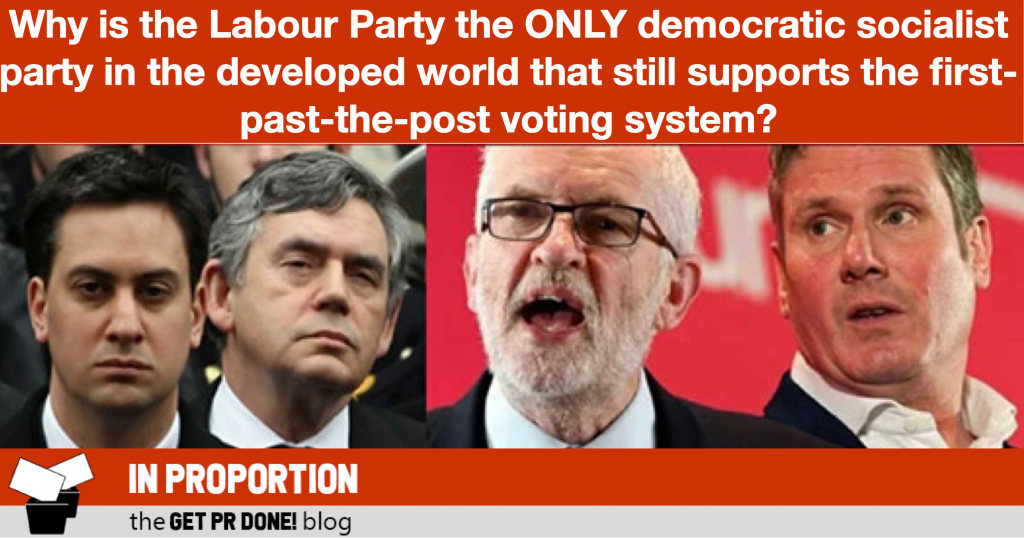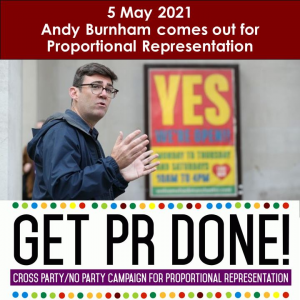
As a result of Labour’s humbling in the Hartlepool by-election last week, several commentators have suggested that you, as Labour leader, are planning to conduct what is often called a “wide-ranging policy review.” As a cross party/no party campaign group for electoral reform, we wish you good luck in this important enterprise.
It gives us no joy whatsoever to read headlines such as this one in Saturday’s Daily Mail: “THE DAY BORIS BLEW UP LABOUR”. Nor to be properly warned by Labour MP Clive Lewis that progressives face having an “almost hegemonic Conservative Party that is now dominating politics.”
Please accept this IN PROPORTION blog from GET PR DONE! as a contribution to your review and specifically on one policy area in which we have some expertise: why the UK urgently needs a far fairer electoral system, namely proportional representation (PR), and why the Labour Party must take the lead to achieve it. We think your party has to rise to the challenge because Labour potentially has so much to offer the working people of this country.
Almost thirty years ago, Labour was ‘down and out’ as it is again today. After more than a decade of Thatcherism and its savage blows inflicted on working people, Labour was widely predicted to win the 1992 general election. Instead, their new leader, John Major, lead the Tories to their fourth victory in a row…and hence Labour’ fourth successive defeat.
Two leading backbench Labour MPs of the day, Robin Cook and Mo Mowlam, decided that there had to be an alternative to our wretched ‘winner takes all’, first-past-the-post voting system (FPTP). As you know, both went on to become well-respected cabinet ministers, Cook as Foreign Secretary and Mowlam as Northern Ireland Secretary and are still favourably remembered.
They began writing on the urgent need for electoral reform. What they concluded in 1993 could have been written in 2021.
‘The people we represent pay the penalty’
In his foreword to a 1993 Labour Campaign for Electoral Reform pamphlet, Edinburgh Central MP Cook wrote:
I am not prepared to put up with a system which once every generation… gives us an opportunity to get in with a majority the way the Conservatives do and govern the same way. It is not we who pay the penalty, but the people we represent. When we win, let us seize the opportunity to change the electoral system so we do not have ever again to return to elective dictatorship of the kind we have experienced.
At the same time, Mowlam, MP for Redcar — once a usually safe, typical “Red Wall” seat but now, as we are sure you know, a Tory seat since 2019 — also wrote about the widespread disillusionment with politics that that FPTP had brought.
What convinced me was listening to voters, a great many of whom are disillusioned with politics and fed up with the political process, the whole political culture of the country they don’t feel a part of. If we are going to change that, we need to change the electoral system.
We were so impressed with their wisdom that we recently published a blog entitled: Cook & Mowlam: Labour pioneers for electoral fairness
As you know, Sir Keir, Tony Blair did make a manifesto commitment to electoral reform during the 1997 election campaign, which Labour won. But Blair, on seeing the electoral dividend bestowed by FPTP, shelved the idea. Labour has never made a serious promise on electoral reform since. (Both Cooke and Mowlam died relatively young in 2005 and were no longer able to lead a Labour campaign for PR.)
Two minor stipulations
We recognise that Hartlepool was a single by-election. Proportional representation “rules” would operate somewhat differently in a by-election (and such “rules” are beyond the scope of this letter.) Instead, we all should be completely fed up with the way that the rigged FPTP voting system works against progressive politics in the majority of all 650 constituencies. So this letter has a far greater scope than what happened in Hartlepool alone.
And speaking of Hartlepool and PR, we do add – gently- one caveat: If Labour only gains 28.7% of the total vote (as Labour did last week here) in hundreds of other “Hartlepools” in a 2023 or 2024 general election, PR will be of relatively little use to most Labour candidates. Your party does need popular policies to win in a general election and hence many are suggesting a wider policy and organisational review is in order. But again, that is outside the scope of this letter.
Ten reasons why Labour should support PR.
1) We would no longer be plagued by minority rule as we are today. Seats won would match votes. A party that did not gain the overall majority support of voters such as the Tories today would no longer be able win a huge landslide of seats at Westminster. (In 2019, they won 43% of the vote, yet hold 56% of the seats.)
2) General elections would no longer be fought almost exclusively in one hundred or so “marginal” seats that might be won or lost by a party. Henceforth, every vote in the entire UK would count and ACTUALLY MATTER.
3) Moreover, the predominant role of so-called “safe seats” would dramatically decrease. Few people would say, as many do now, “I live in a safe seat; my vote has never made a difference“.
4) Under PR, the “electoral power” of votes would no longer be dependent on where you lived in the UK as it does at present. A serious demographic problem now for Labour is that too many of its voters live in urban areas and thus it often “wins big” in cities and “loses small” elsewhere. In 2019, 19 of the 25 constituencies with the biggest majorities were won by Labour.
5) The scourge of tactical voting would go the way of the dodo. Finally, millions of us could vote for the candidate WE WANTED and not for the candidate whom we thought was best placed to stop the candidate WE MOST DISAGREED WITH.
6) A December 2019 survey showed that 75% of Labour Party members support PR. We are confident that figure is higher today. A total of 215 CLPs have passed motions in favour of PR and those numbers will rise again in coming weeks. Support for PR is coming from all wings of Labour and from more and more of its ‘leading lights’. On 5 May, popular Manchester mayor Andy Burnham endorsed PR. (See below).
7) By comparison, the upper ranks of the Conservative Party hate PR. Why? Because if a fair voting system comes in, the Tories know they would lose more than 100 seats. It is surely no coincidence that the Tories want to change back to FPTP for mayoral elections!
8) With PR, we would at last have an opportunity to begin creating a more cooperative approach in the UK’s political culture, one focused on problem solving rather than the extreme partisanship and nastiness that is Westminster’s daily — and embarrassing — speciality.
9) Social democrats worldwide endorse fairness. As the illustration atop this letter explains, supporting FPTP puts the British Labour Party far out of alignment with global left-wing sentiment. New Zealand uses PR for its elections and this has transformed politics there. Back in October 2020, Kiwi Labour won an overall majority.
10) Labour has no practical options other than to endorse PR…
Mission Impossible
You will not need reminding that Labour need a UK-wide swing of 10.52% in order to win the 123 seats required to have a majority of just one seat at the next general election. That is larger than any swing achieved by any party since Attlee won in 1945 (under very different circumstances).
Also, Labour have never won a general election with fewer than 37 seats in Scotland. Currently, Labour has but a single one and the mood in Scotland appears to have swung permanently away from the main Westminster parties. There is now a pro-independence majority in Holyrood.
Moreover, FPTP encourages gerrymandering of constituency boundaries to suit the whims of the ruling party. The Tories are right now hard at work enhancing their electoral chances further and as many as 15 more seats could swing to them as a result.
Labour still commands widespread support in many parts of the UK and, even at the most recent election, achieved 10m votes. But many of these votes were, as suggested above, ‘wasted’ in constituencies with huge majorities. For example, Dan Carden won Liverpool Walton with 84% of the vote in 2019. Diane Abbott in London Hackney had a 33,000-vote lead on her nearest opponent. But under FPTP maths, these two routs result in a mere two seats for Labour.
Labour, Sir Keir, must endorse PR in its election manifesto and learn to work with smaller progressive parties who already support PR. Otherwise, to win a majority next time isn’t merely, ‘a mountain to climb’ for Labour, as many have been saying, it is simply Mission Impossible.

IN PROPORTION is the blog of the cross-party/no-party campaign group GET PR DONE! We are campaigning to bring in a much fairer proportional representation voting system. Unless otherwise stated, each blog reflects the personal opinion of its author.
We welcome contributed blogs. Send a brief outline (maximum 75 words) to getprdone@gmail.com
Join the very active Facebook group of GET PR DONE! (2,250 members as of 9 May) at: https://www.facebook.com/groups/625143391578665/